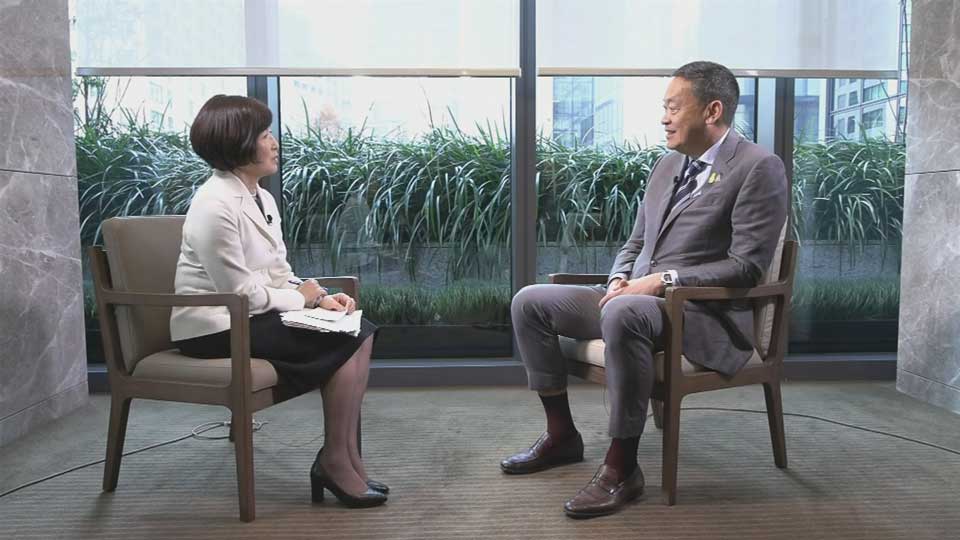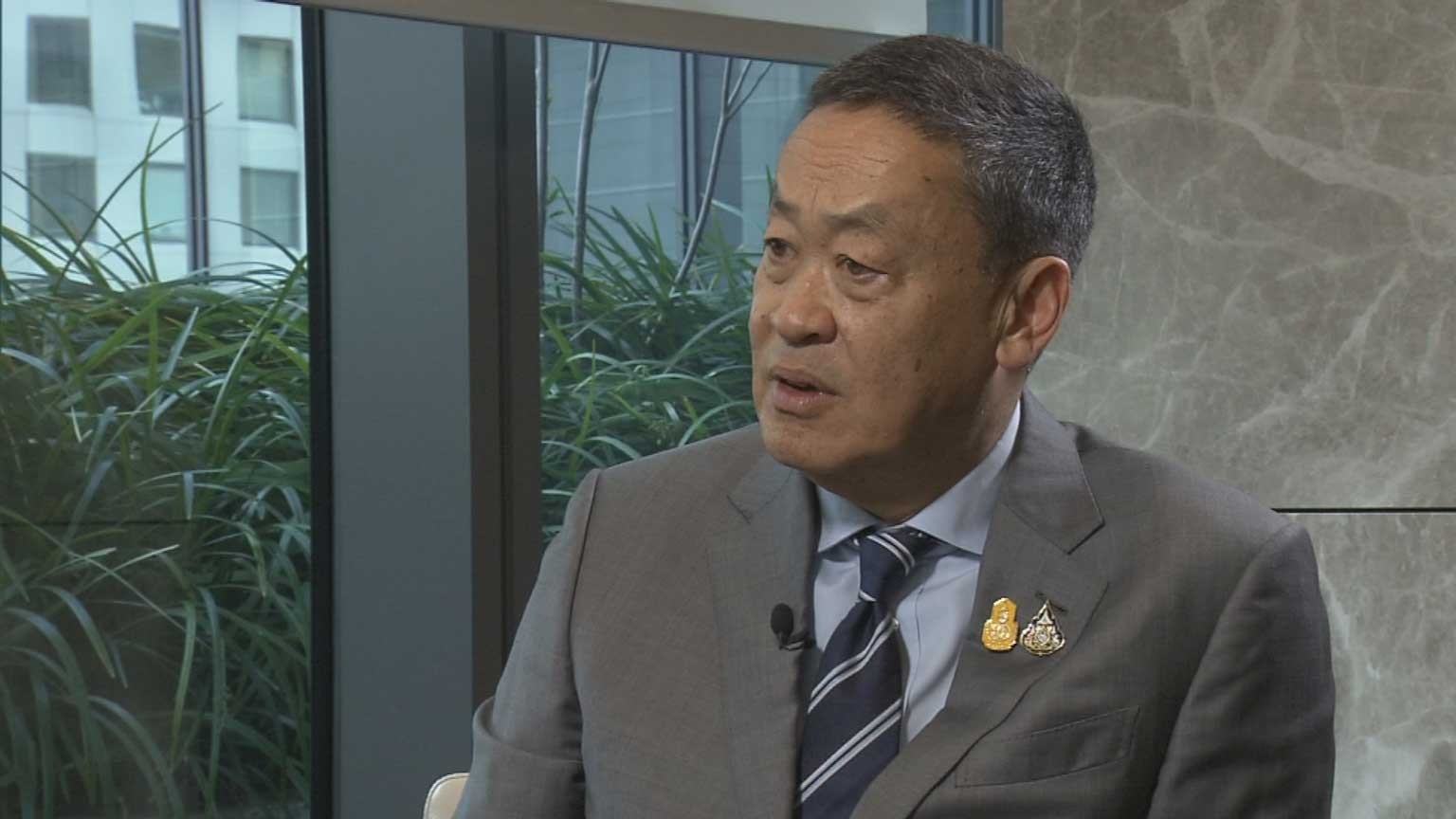Doden Aiko: You have a track record of running a business successfully. How has running the country been so far in terms of balancing the expectations of the voters?
Srettha Thavisin: After I announced I was entering politics, General Prayut, the previous prime minister, told me it's not the same as running a business. He couldn't be more right. It's totally different world.
There are many parties, parliament, business interests and the press. And most importantly, the people. Every day there are new problems and things to take care of. But so far I think we've done a decent job.
There are some short-term problems we have resolved. For example, cutting household expenses like electricity and petrol, and pausing farmer debt. And our team has crafted a long-term strategy. Foreign investment, for example, is one of the main reasons why I'm here. Yesterday, I met with maybe 10 of the biggest Japanese companies investing in Thailand and had fruitful discussions.
Doden: What's the most challenging part of running the country so far?
Srettha: There's no such thing as the most or the one ― there are many issues. But if I had to choose one, it's the economic well-being of the people, especially those with low incomes.
Doden: You've been persuading countries to invest in your signature Landbridge project. Why does this project matter? Is it about complementing China's Belt and Road Initiative, as you said in Beijing?
Srettha: In part. Thailand is bordered by the Andaman Sea and the Gulf of Thailand. Sixty percent of the oil transported globally goes to the Strait of Malacca below Singapore. It's very crowded and the volume of business through the strait results in accidents.
Thailand used to be called the Detroit of the East. We manufactured millions of cars. We're now moving up into high tech, high profit industries.
As prime minister I've visited many countries and persuaded many high-tech firms like Google, Microsoft, AWS ― and hopefully Tesla. Many big industries in China are also looking to invest and build factories in Thailand.
Although Thailand has a population of around 70 million, domestic demand isn't sufficient so products need to be exported. We already have deep seaports, which are ranked among the world's top 20. But because the Malacca Strait is very crowded, a mega-project is needed to ensure goods can be transported to China, India, the Middle East and Africa. We need to ensure investors know we have placed great importance on building a world-class infrastructure in the Landbridge project. Linking it to the Belt and Road Initiative is also another reason.
Doden: Why hasn't it been easy to get the Japanese private sector onboard?
Srettha: It was clear from yesterday's seminar that many Japanese businesses are interested in becoming investors. Last week, I met with an Asian conglomerate that expressed interest and Americans have expressed interest. I think we need to show we're serious because this project has been floated for around 30 years without a genuine effort to make it happen. Since my government announced the project, we've been dead serious in communicating to the world that we will make it happen.
Doden: What does it offer the Thai people?
Srettha: Thailand can become a manufacturing hub for various heavy industries and industrial estates will pop up around it.
Doden: You've been concerned that Thailand's economic growth is not inclusive enough. How do you plan to remedy that?
Srettha: Many Thais are farmers, and technologies have been lacking in the agricultural sector. I just had a meeting with Kubota, one of the largest agricultural machinery producers in Japan, and asked for their help in thermal smart farming and so on.
Many factors can help Thai farmers. For example, precision agriculture, better fertilization, better machinery, smart farming, better irrigation, etc. Those will help elevate farmers' livelihoods.
Having said that, we also need to become more industrialized. To do that we need to carry out the Landbridge project. At the moment we are seeing tremendous amount of interest by Chinese, Japanese and American investors in building data centers and high-tech industry in Thailand. So we're on the right track.
Doden: There's been focus on your 10,000 baht handout.
Srettha: The digital wallet, yes.
Doden: Would I be right to say that it won't be the only solution?
Srettha: Yes, it's just an immediate way to help. Many Thais are saddled with personal debt and can't afford to start a new business. If a family of three or four people get 10,000 baht digital wallet payments, they can start a new business.
It's going to be very helpful that the digital wallet will be contained in the areas where people live so they won't have to move to urban centers and can prop up local economies. Also, the six-month timeline for using the money is also very important. Imagine half a trillion baht being put into people's pockets. Businesses will produce more goods, labor will increase and productivity will rise.
Doden: I believe the key is for the economy to be inclusive and sustainable. But investment sentiment can be quite fleeting. Recently tech companies have boosted their presence in countries like Vietnam. And the IMF estimates that Vietnam's GDP might overtake Thailand by 2026. How would you position Thailand within the context of ASEAN?
Srettha: Vietnam has an advantage in terms of number of population. So there's no doubt its GDP will sooner or later be larger. But having said that, we need to be looking at ourself. I think Vietnam's third quarter GDP growth exceeded 5%, while our was only 1.5%. That's a big concern, and why I've been traveling around the world and inviting world-class investors to build data centers, factories and high-tech industry to ensure we're set over the long-term.
Vision on Thailand's future

Doden: How do you envision the future of Thailand in five or 10 years?
Srettha: I'd like to see Thailand become a manufacturing hub for various industries. I'd like to see people's income rise to the proper level. Also, we're an agricultural country. Given the global geopolitical situation, maintaining food security is key. But we can't have farmers continue to be as poor as they are. I'd like to see their income triple within three to four years because they are the foundation of the country.
Doden: And that is the key to the stability of your country?
Srettha: Yes. But in addition to that we'd like to remain neutral in terms of the conflicts around the world. For example, the trade conflict between China and the US is deeply destabilizing. We look up to both countries and would really like them to resolve their differences.
Doden: As you say, alleviating poverty, or fixing the income disparity, and also bringing more skills to farmers and laborers are among the key measures to stabilize and boost the economy. And perhaps they're also the key to winning the next election as well.
Srettha: Winning reelection or getting more seats in parliament is really the byproduct of the hard work we must do to ensure we deliver what we promise. If we don't, then we will be punished by the people. Going into politics is not about winning seats, it's about increasing the well-being of the people. If you achieve that, the rest will take care of itself.
Doden: So that's the future that you are looking forward to?
Srettha: Yes. Thank you very much.

